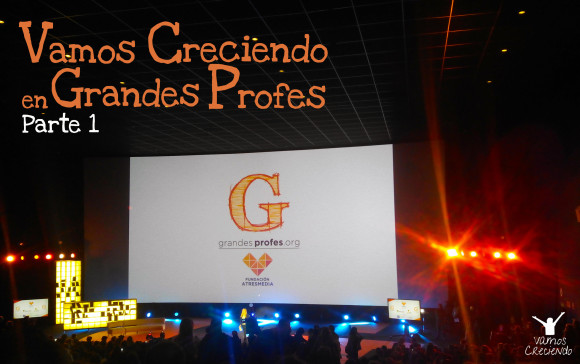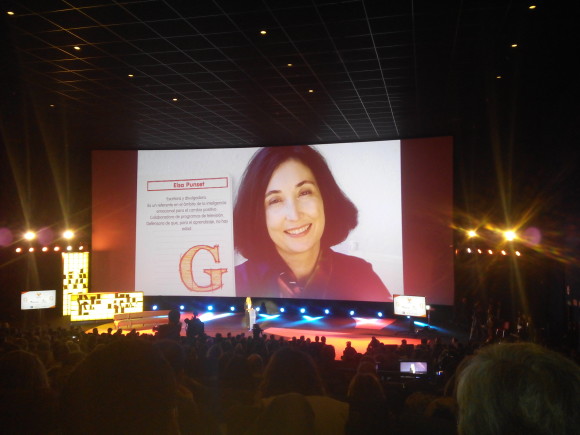Sure many of you know that yesterday was the Great Profes event in Kinepolis cinemas, attended by top professionals from various fields related to the world of education.
I was one of the 2.100 teachers who had the privilege of listening to professionals carving Elsa Punset, Mario Alonso Puig, Mary Garaña, Roberto Brasero or Xabier Valbuena.
Any information that these professionals gave us during his brief papers are little treasures that I share with you. I think they are very useful for both teachers and parents.
In order not to overload you with a lot of information, I have divided this post into two parts..
Today I will talk mainly about the keys that Elsa Punset gave us during her presentation, and next week we will review all the keys that the rest of the speakers offered us.
The first presentation was that of Elsa Punset and I must say that she amazed me.
Elsa is a writer and disseminator but, above all, transmits an overwhelming calm and optimism even from a great distance.
During the half hour that his presentation lasted, entitled "The emotional classroom", He told us about the basic need to give and receive affection and the impact that the technological revolution is having on our lives and those of our students, in addition to giving us three basic and essential clues.
Track 1. digital kids.
His presentation could not miss the fact that we are facing the Digital Age and we are educating digital children.
He mentioned an experiment carried out by Nicholas Negroponte in which tablets were left in the jungle waiting to see what the children would do with those tablets.
Do you know how long it took the first child to turn on the first tablet?? Four minutes! Without having had any dealings with a similar device before!! But the most surprising thing is that after a few weeks the children of that village were already handling the tablets and their applications perfectly..
What I think Elsa wanted to convey to us with this experience is that our children learn and are exposed to more information than ever. That is why they need us as teachers to help them develop the following skills:
- Critical thinking.
- Creativity.
- Decision making.
- collaboration.
- Communication.
If our little ones are not able to collaborate, communicate with peers, make decisions and choose what information is useful and of quality from what is not, they will have a serious problem, because they will be surrounded by a lot of information that they will not know how to use. Without forget, of course, the creativity, that cannot be diminished or replaced by technologies.
Another of the points that Elsa mentioned during her presentation were the factors that are important when educating children.
- The character.
- Family.
- The environment.
- Teachers.
They seem very obvious factors, but I liked that he reminded us of them because sometimes it seems that we teachers forget the brutal influence we have on our students and that how we treat them during the stage in which they are with us can absolutely mark their future.
Track 2. emotional children.
The second clue he told us about was the emotional children.
Here he made a statement that we sometimes seem to forget too: “We cannot educate without educating emotions”
I think that on some occasion we have already talked about the importance of our state of mind and how it affects the teaching-learning process..
Yesterday Elsa gave us some clues about what we can do to train the brain of our children in positive.
- Naming emotions. Our little ones must learn to put a name to what they feel at all times. It is a way of understanding themselves.
- Help them manage these emotions. Logically, there is always a first moment to face an emotion. That is why it is important that we teach our children to face emotions and know how to manage them..
- Learn to live with mixed emotions. And! You can learn to live with emotions, and more with mixed emotions!
- Learn to create positive and safe climates. through our words, our gestures, etc. We can create safe and positive climates for children to learn.
Track 3. trainable kids.
your child can!! all children can.
Another key to Elsa Punset's paper is that the brain is plastic and, therefore, it is trainable. We must teach children that if they want to achieve their goals, they must leave their comfort zone. That's why it's It is essential that we teach them self-control and how to manage their effort.
Brilliant presentation by Elsa Punset!! I don't know if with this little summary I have managed to convey to you everything he told us, but, at least, i hope you got the gist.
Remember that next week I will continue to review the presentations of the rest of the professionals who participated yesterday in Grandes Profes.
Do not miss it!
“Our expectations influence how we perceive reality”
Elsa Punset
Tags: digital, Education, educate, Elsa Punset, emotions, event, big ones, child, profes, technology




 Español
Español English
English Français
Français Deutsch
Deutsch 中文(简体)
中文(简体) Português
Português
